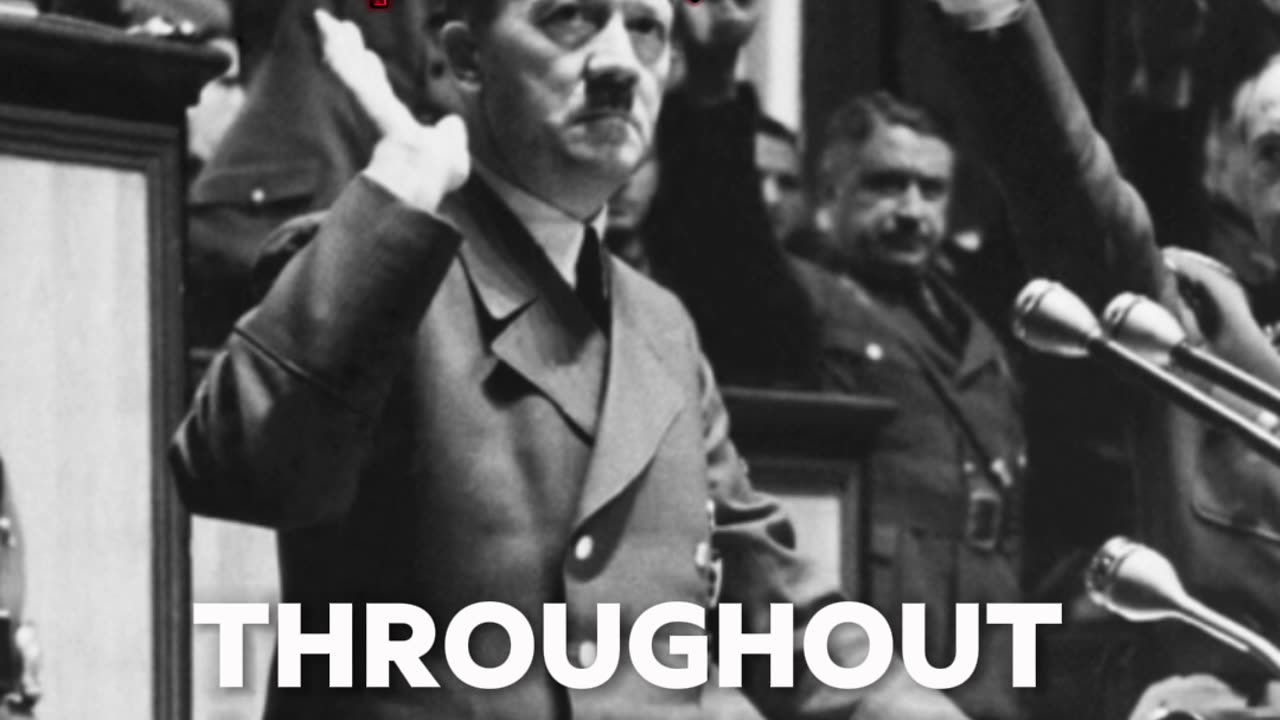Premium Only Content

Hitler's Response to Roosevelt at the Reichstag – April 28, 1939
Background Leading Up to Hitler's Response to Roosevelt on April 28, 1939
Growing Tensions in Europe: By April 1939, Europe was on the brink of war. Germany had already annexed Austria and the Sudetenland, and tensions were escalating over the fate of Poland.
Roosevelt's Appeal: On April 14, 1939, U.S. President Franklin D. Roosevelt sent a message to Hitler and Mussolini, urging them to pledge not to attack a list of specified countries for at least ten years. Roosevelt’s appeal aimed to preserve peace and stability in Europe amid growing fears of another major conflict.
German Military Buildup: Germany had been rapidly rearming and expanding its military capabilities in violation of the Treaty of Versailles. Hitler's aggressive foreign policy and territorial ambitions were causing alarm across Europe and the world.
Hitler's Response to Roosevelt at the Reichstag – April 28, 1939
On April 28, 1939, Adolf Hitler delivered a lengthy and detailed response to President Roosevelt’s appeal in a speech at the Reichstag. This speech served as a rebuttal to Roosevelt's call for peace and as a justification of Germany’s foreign policy.
Key Points of Hitler's Response:
Dismissal of Roosevelt’s Appeal: Hitler began by dismissing Roosevelt’s message as hypocritical and unrealistic. He argued that the United States, which was geographically distant and relatively safe from European conflicts, had no right to dictate terms to Germany.
Critique of U.S. Foreign Policy: Hitler criticized American foreign policy, pointing out perceived inconsistencies and what he saw as America’s own imperialistic actions. He accused the U.S. of interfering in European affairs while ignoring its own issues.
Historical Grievances: Hitler recounted a series of historical grievances against the Treaty of Versailles and the treatment of Germany after World War I. He emphasized how the treaty had imposed unjust terms on Germany, leading to economic hardship and loss of territory.
Defense of German Actions: Hitler defended Germany’s recent actions, including the annexation of Austria and the Sudetenland, as steps towards self-determination and national unification. He argued that these moves were supported by the local populations and were correcting historical wrongs.
Accusations Against Other Powers: Hitler accused other European powers, particularly Britain and France, of hypocrisy and aggression. He claimed that these nations were trying to encircle Germany and prevent its legitimate growth and self-defense.
Peaceful Intentions: Despite the aggressive tone, Hitler asserted that Germany desired peace and had no intention of attacking other countries. He framed Germany’s military buildup as a defensive measure against external threats.
Critique of League of Nations: Hitler expressed disdain for the League of Nations, describing it as ineffective and biased against Germany. He used this critique to further justify Germany's unilateral actions and rejection of international oversight.
Call for Respect and Sovereignty: Hitler concluded by demanding respect for Germany’s sovereignty and its right to self-determination. He insisted that Germany would continue to pursue its interests and would not be swayed by external pressures or appeals.
Analysis:
Hitler’s response to Roosevelt was a strategic effort to present Germany as a strong, independent nation unfairly targeted by other powers while justifying its aggressive policies.
Rejection of External Interference: By dismissing Roosevelt’s appeal, Hitler aimed to assert Germany’s sovereignty and reject any external attempts to influence its policies. This stance was intended to rally domestic support and to portray Germany as a nation standing up against foreign interference.
Historical Justification: Hitler’s recounting of historical grievances against the Treaty of Versailles was a common theme in his rhetoric. By framing Germany as a victim of unjust treaties, he sought to legitimize his regime’s actions as efforts to rectify historical wrongs.
Defensive Posture: Although aggressive in tone, Hitler’s speech emphasized that Germany’s actions were defensive. He portrayed Germany’s military buildup and territorial expansions as necessary measures to ensure the nation’s security and self-determination.
Critique of Other Powers: By accusing other nations of hypocrisy and aggression, Hitler attempted to deflect criticism and to shift blame. This strategy aimed to undermine the moral authority of Germany’s critics and to justify the regime’s policies.
Appeal to National Pride: Hitler’s speech was designed to instill national pride and unity. By demanding respect for Germany’s sovereignty and highlighting the nation’s strength, he aimed to galvanize support among the German populace and to reinforce the legitimacy of the Nazi regime.
Overall, Hitler’s response to President Roosevelt on April 28, 1939, was a calculated effort to reject external appeals for peace, to justify Germany’s aggressive policies, and to rally domestic support by appealing to national pride and historical grievances. This speech was part of the broader Nazi strategy to present Germany as a strong, sovereign nation reclaiming its rightful place in the world amid growing international tensions.
-
 1:22:23
1:22:23
Game On!
3 hours ago $3.25 earnedJosh Allen PROVES he is the NFL MVP after DESTROYING the Ravens!
26.4K2 -
 9:12
9:12
Space Ice
22 hours agoVan Damme's Kill 'Em All Too Proves He's The Anti-Seagal The World Needs - Best Movie Ever
37.9K18 -
 47:50
47:50
Survive History
22 hours ago $6.49 earnedCould You Survive as an Allied Frontline Soldier in World War Two?
63.7K7 -
 1:05:53
1:05:53
TheDozenPodcast
21 hours agoFist fights, murder, street life: Tommy Hench
32K8 -
 20:56
20:56
Bearing
21 hours agoThe Useless WOKE Bureaucrats That Let California BURN 🔥
25.2K47 -
 29:00
29:00
hickok45
1 day agoSunday Shoot-a-Round # 264
34.5K12 -
 8:34
8:34
Misha Petrov
1 day agoMom ATTACKS Principal Protecting Kids at School Game—"Nonbinary" Lawmaker Meltdown!
35.3K37 -
 42:58
42:58
PMG
1 day ago $3.41 earned"The World Health Organization only wants to work with Nations that are compliant!"
49.4K7 -
 12:19
12:19
DEADBUGsays
22 hours agoSTRANGE THINGS #13
30.6K2 -
 16:28
16:28
Fit'n Fire
1 day ago $0.73 earnedBeretta 92X RDO Centurion and Cyelee SRS8 Chameleon Red Dot
21.7K2